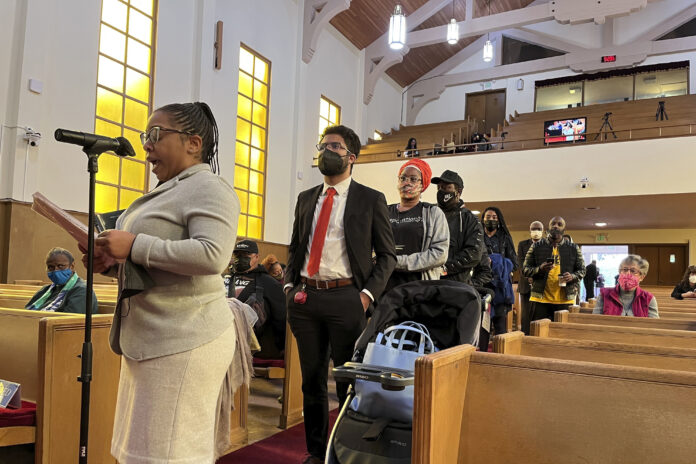
By Voice & Viewpoint Newswire
As part of California’s historic Assembly Bill 3121 (AB 3121), the California Task Force to Study and Develop Reparation Proposals for African Americans (Reparations Task Force) today released an interim report providing an in-depth overview of the harms inflicted on African Americans in California and across the nation due to the ongoing legacy of slavery and systemic discrimination. The interim report includes a preliminary set of recommendations to the California Legislature and a final report is expected to be issued in 2023.
The Reparations Task Force is a first-in-the-nation effort by a state government to study slavery, its effects throughout American history, and the compounding harms that the United States and Californian governments have inflicted upon African Americans.
“Without accountability, there is no justice. For too long, our nation has ignored the harms that have been — and continue to be — inflicted on African Americans in California and across the country,” said California Attorney General Rob Bonta.
“California was not a passive actor in perpetuating these harms. We must double down on our efforts to address discrimination in our state and nation and take a hard look at our own history, including at the California Department of Justice. This interim report is a historic step by the State of California to acknowledge the insidious effects of slavery and ongoing systemic discrimination, recognize the state’s failings, and move toward rectifying the harm. I commend the Reparations Task Force for their commitment to this effort and for being a model for partners across the nation. I urge every American to read the task force’s report and join with us in recommitting ourselves to justice.”
“It has been an honor and a privilege to supervise the release of this monumental interim report,” said Task Force Chair Kamilah Moore. “A year-long effort, this 500+ page report chronicles the harms against the African American community, starting with the transatlantic slave trade, the institution of U.S. chattel slavery, Emancipation and the broken promise of Reconstruction, genocidal Jim Crow, to contemporary harms; it is the most extensive government-issued report on the African American community since the Kerner Commission in 1968. Thus, it is my hope that people in California and across the United States utilize this report as an educational and organizing tool, as this interim report exceeds expectations in substantiating the claim for reparations for the African American/American Freedmen community on the municipal, state and federal level.
“It is a privilege to sit on a task force that has the moral obligation of fulfilling the task of developing measures that will right the wrongs which were collectively perpetuated against the African American community solely on the basis of the color of our skin,” said Task Force Vice Chair Dr. Amos C. Brown. Other groups that have suffered exclusion, oppression, and downright destruction of human existence have received reparations, and we should have no less.
The institution of slavery is inextricably woven into the establishment, history, and prosperity of the United States. Constitutionally and statutorily sanctioned from 1619 to 1865, slavery deprived more than four million Africans and their descendants of life, liberty, citizenship, cultural heritage, and economic opportunity. Following the abolition of slavery, government entities at the federal, state, and local levels continued to perpetuate, condone, and often profit from practices that brutalized African Americans and excluded them from meaningful participation in society. This legacy of slavery and racial discrimination has resulted in debilitating economic, educational, and health hardships that are uniquely experienced by African Americans.
AB 3121 charges the Reparations Task Force with studying the institution of slavery and its lingering negative effects on living African Americans, including descendants of persons enslaved in the United States and on society. The legislation, enacted on September 30, 2020, requires the task force to also recommend appropriate remedies of compensation, rehabilitation, and restitution for African Americans, with a special consideration for descendants of persons enslaved in the United States. The Reparations Task Force’s work is ongoing and the interim report primarily focuses on identifying and summarizing the myriad badges and incidents of slavery.
The interim report builds on months of public hearings, hours of expert, public, and witness testimony, and numerous records submitted to the task force.
In the interim report released today, the Reparations Task Force — over the course of 13 chapters — provides an accounting of many of the harms of slavery and systemic discrimination in California and across the nation. The interim report offers a synthesis of many of the relevant issues, ranging from enslavement and government sanctioned residential segregation to environmental injustice and political disenfranchisement. Some of the key findings noted in the interim report include:
- In order to maintain slavery, colonial and American governments adopted white supremacy beliefs and passed laws in order to maintain a system that stole the labor and intellect of people of African descent;
- In California, racial violence against African Americans began during slavery, continued through the 1920s, as groups like the Ku Klux Klan permeated local governments and police departments, and peaked after World War II, as African Americans attempted to move into white neighborhoods;
- Due to residential segregation and compared to white Americans, African Americans are more likely to live in worse quality housing and in neighborhoods that are polluted, with inadequate infrastructure;
- American government at all levels, including in California, has historically criminalized African Americans for the purposes of social control, and to maintain an economy based on exploited Black labor; and
- Government laws and policies perpetuating badges of slavery have helped white Americans accumulate wealth, while erecting barriers which prevented African Americans from doing the same. These harms compounded over generations, resulting in an enormous gap in wealth between white and African Americans today in the nation and in California.
Additional information about the work of the Reparations Task Force and the ongoing public hearing process is available here.
A copy of the interim report is available here.

